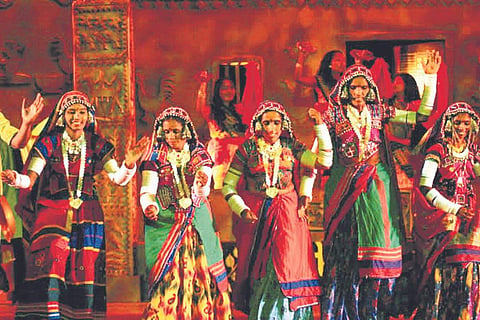
- LIFESTYLE
- FASHION
- FOOD
- ENTERTAINMENT
- EVENTS
- CULTURE
- VIDEOS
- WEB STORIES
- GALLERIES
- GADGETS
- CAR & BIKE
- SOCIETY
- TRAVEL
- NORTH EAST
- INDULGE CONNECT

The Margazhi Village Festival is back, packed with vibrant and colourful performances by troupes from all over South India. The performances this year include Singarimelam from Kerala, Tappeta Gullu from Andhra Pradesh, Pooja Kunitha from Karnataka, Kavadi Attam from Tamil Nadu and Lambani from Telangana and Andhra Pradesh.
Singarimelam is a traditional percussion ensemble of Kerala that consists of chenda (drums), ilathalam (cymbals), and kuzhal (pipes). It is performed at festivals, weddings, and other occasions.
December 20 to 24, 11.30 am, 12.30 pm, 3.30 pm & 4.30 pm.
Tappeta Gullu, a captivating folk dance from Andhra Pradesh, is a vibrant display of devotion, unity, and skill. Dancers in colourful costumes perform acrobatic movements to the rhythm of a flat drum, invoking the rain goddess, Gangamma. According to belief, this dance not only pleases the deity but also strengthens community bonds.
December 27 to 31, 11.30 am, 12.30 pm, 3.30 pm & 4.30 pm.
Pooja Kunitha is a vibrant, ritualistic folk dance from Karnataka, performed predominantly in the Mandya, Bengaluru and Mysore districts. Dancers carry a five-foot high bamboo frame, adorned with saris and flowers, on their heads. The dance, performed to propitiate Goddess Shakti, involves acrobatic movements and lacks a specific storyline.
January 3 to 7, 11.30 am, 12.30 pm, 3.30 pm & 4.30 pm.
Performed in reverence of the Hindu God of war Lord Murugan, Kavadi Attam or the burden dance is a type of ceremonial sacrifice and offering. There is a high degree of coordination and choreography involved in the dance and is generally performed during the Thaipusam Festival.
January 3 to 7, 11.30 am, 12.30 pm, 3.30 pm & 4.30 pm.
Lambani is an ancient folk dance of Telangana (and Andhra Pradesh), which is performed by the semi-nomadic tribes called Lambadis or Banjaras or Sengalis. The dance owes its origin to tribes in Rajasthan and involves everyday themes like harvesting, planting and sowing. The dancers wear colourful embroidered costumes embellished with glass beads.
January 24 to 28, 11.30 am, 12.30 pm, 3.30 pm & 4.30 pm.
At DakshinaChitra Heritage Museum, Muttukadu, East Coast Road.